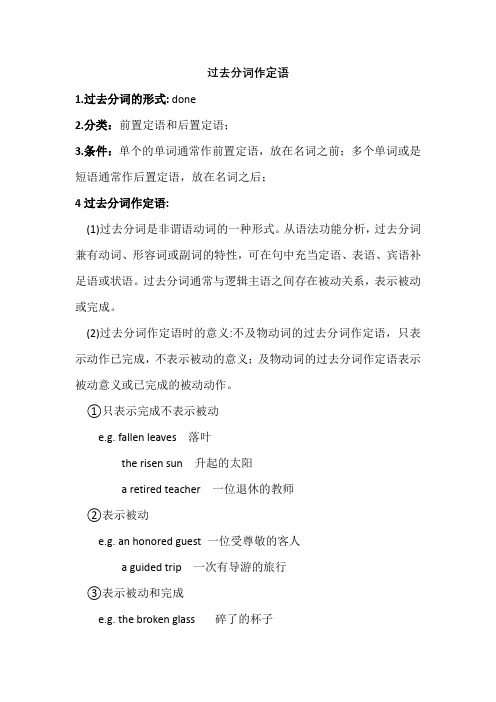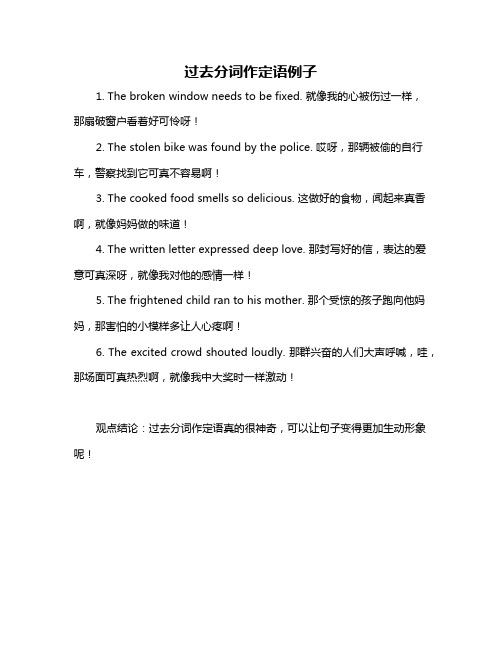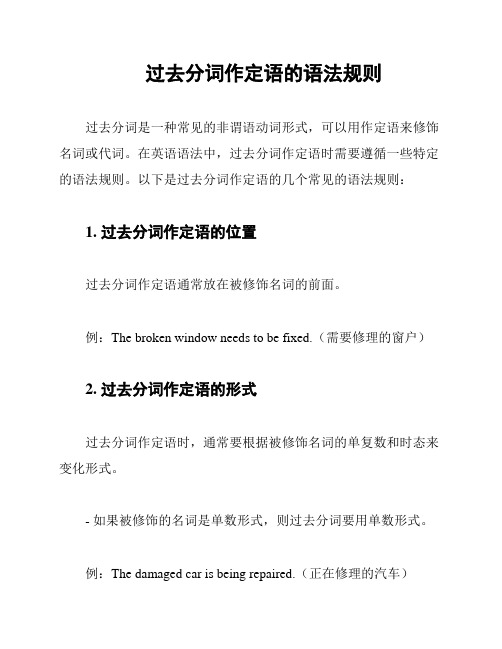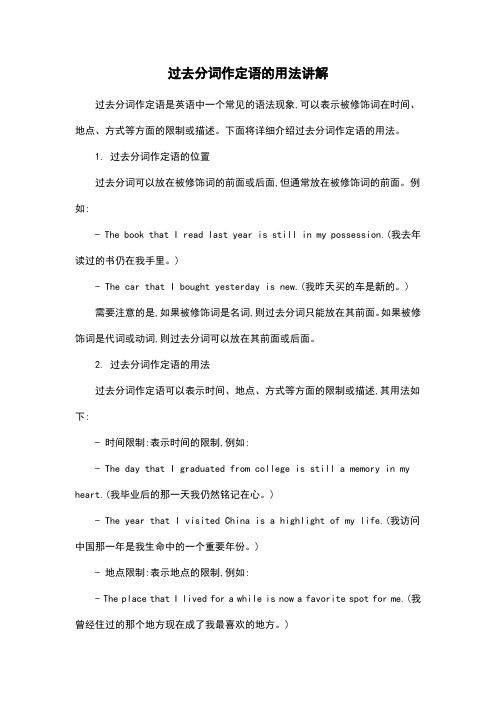过去分词作定语
过去分词作定语和宾语补足语

过去分词作定语和宾语补足语过去分词在英语语法中有着多种用法,其中最常见的方式之一是作为定语和宾语补足语。
本文将详细介绍过去分词在这两个语法角色中的具体应用和特点。
一、过去分词作为定语1. 定义:过去分词作为定语时,用来修饰名词或代词,给出该名词或代词所具备的状态或特征。
2. 形式:过去分词通常由动词的过去分词形式构成,加上适当的前置修饰词,如冠词、指示代词等。
a) A broken cup (一个破碗) - 这里的broken修饰名词cup,表示它的状态是破碎的。
b) The stolen necklace (那条被偷的项链) - 这里的stolen 修饰名词necklace,表示它已经被偷。
a) 过去分词作为定语时,通常放在名词前面。
b) 过去分词作为定语时,与所修饰的名词之间一般是被动或完成的关系。
c) 过去分词作为定语时,可以用来修饰人、物、地点等。
二、过去分词作为宾语补足语1. 定义:过去分词作为宾语补足语时,用来补充说明或修饰及物动词的宾语,指出宾语所具备的状态或经历的动作。
2. 形式:过去分词作为宾语补足语时,通常跟随及物动词或使役动词一起使用。
a) He made me cry (他让我哭了) - 这里的cry作为宾语补足语,说明了宾语me所经历的状态是哭泣。
b) They found the door locked (他们发现门被锁了) - 这里的locked作为宾语补足语,说明了宾语the door的状态是被锁上的。
a) 过去分词作为宾语补足语时,常常与及物动词或使役动词一起构成宾语补足结构。
b) 过去分词作为宾语补足语时,说明了宾语所经历的动作、状态或具备的特征。
本文详细介绍了过去分词作为定语和宾语补足语的用法和特点。
过去分词作为定语时,用来修饰名词或代词,并表示其状态或特征;过去分词作为宾语补足语时,用来补充说明及物动词的宾语的状态或经历的动作。
熟练掌握过去分词的这两种用法,可以帮助我们更准确地表达和理解英语句子的含义。
过去分词作定语

过去分词作定语1.过去分词的形式: done2.分类:前置定语和后置定语;3.条件:单个的单词通常作前置定语,放在名词之前;多个单词或是短语通常作后置定语,放在名词之后;4过去分词作定语:(1)过去分词是非谓语动词的一种形式。
从语法功能分析,过去分词兼有动词、形容词或副词的特性,可在句中充当定语、表语、宾语补足语或状语。
过去分词通常与逻辑主语之间存在被动关系,表示被动或完成。
(2)过去分词作定语时的意义:不及物动词的过去分词作定语,只表示动作已完成,不表示被动的意义;及物动词的过去分词作定语表示被动意义或已完成的被动动作。
①只表示完成不表示被动e.g. fallen leaves落叶the risen sun 升起的太阳a retired teacher 一位退休的教师②表示被动e.g. an honored guest 一位受尊敬的客人a guided trip 一次有导游的旅行③表示被动和完成e.g. the broken glass 碎了的杯子the question discussed yesterday昨天讨论的问题a divided country 一个分裂的国家(3)过去分词作定语时的位置①前置定语:单个的过去分词作定语,通常放在被修饰的名词之前。
e.g. The broken vase has been thrown outside.The injured workers are now being taken good care of②后置定语:过去分词短语作定语时,通常放在被修饰的名词之后,它的作用相当于一个定语从句。
e.g. The suggestion (which had been) sent to the committeewas adopted.This will be the best novel of its kind ever written(=that has ever been written).The producer comes regularly to collect the cameras returned to our shop for quality problems.You cannot accept an opinion offered to you unless it is based on facts.③过去分词修饰代词时,应置于被修饰词之后。
过去分词短语作定语

过去分词短语作定语过去分词短语作定语,即指在句子中用过去分词形式的短语来限定、描述名词或代词,在英文中,该现象经常出现,在中文中,也有若干种条件可以用过去分词形式的短语来限定、描述名词或代词。
首先,有些方面,过去分词短语作定语可以表示完成的动作,比如“读完的书”、“写完的文章”,使用过去分词形式的短语可以更加直观地表达出来。
例如:“他对我推荐了一本读完的书”,“你写完的文章已经收到了”。
其次,过去分词短语作定语还可以表示某种被动的状态,如“被取消的会议”、“被遗弃的家园”等等。
例如:“由于疫情的蔓延,许多原定的会议都已经被取消了”、“这里是一座被遗弃的家园,可惜没有人给它带来生机”。
此外,过去分词短语作定语还可以表示泛指性,如“出版的书”、“售出的商品”等等,用过去分词形式的短语更能够清晰地表达出来。
例如:“今年销量最高的是出版的书”、“这家商店售出的商品都质量很好”。
此外,还可以用过去分词短语来表示时间上的先后次序,如“瑞士先发明的手表”、“英国最早开发的商业网络”,它可以表达出某件事是哪国在先后顺序上做出来的。
例如:“瑞士先发明了手表,使得时间可以被准确的衡量”、“英国最早开发的商业网络,使得全球贸易规模大大拓展”。
最后,过去分词短语还可以用来表示一定特定情境下发生的事情,如“受欢迎的电影”、“受人追捧的演出”,用过去分词形式的短语可以更加形象地表达出来。
例如:“这部受欢迎的电影成功地诠释了家庭美好的概念”、“受人追捧的演出让我们沉浸在美妙的旋律中”。
总之,过去分词短语作定语在表达某种状态,事件及其它背景信息时,可以用来某种程度上替代非谓语形式作定语,但也需要注意不要滥用,应根据句意来选择合适的语法结构,以保证文章的连贯。
知识点——过去分词(短语)作定语

过去分词(短语)作定语
【知识点解析】
2. done; being done 与 to be done 作定语的区别 过去分词含有“被动”“完成”两种含义;若表 示“某事正在被做”,通常使用动词的being done 形式;若表示“即将被做”,通常使用动词的to be done形式;
过去分词(短语)作定语
【知识点解析】
He, dressed in a white uniform, looks like more a cook than a doctor.
Can the audience seated/sitting at the back of the classroom hear me?
过去分词(短语)作定语
【知识点解析】
二、过去分词做定语 1. 单个的过去分词一般作前置定语,即通常放在所修 饰的名词前,过去分词短语一般做后置定语,即通常 放在所修饰的名词后。如: testified people the affected person ordinary people exposed to cholera. the river polluted by the dirty water from London
My mother, lost in thought, didn’t hear us entering the room.
Te cocked by my mother.
The theory remaining to be proved was put forward by Mr. Smith.
过去分词作定语

过去分词作定语1、过去分词作定语的位置①单个的过去分词作定语,常置于被修饰词前。
the broken clock 坏了的钟表the stolen backpack 被偷走的背包②过去分词短语作定语,常置于被修饰词后,相当于一个定语从句。
Most of the people invited to the party didn’t come. 大部分被邀请参加派对的人没有来(=Most of the people who were invited to the party didn’t come.)注意:①有些单个的过去分词,在习惯上往往置于被修饰词后。
There is little time left. 时间不多了。
②过去分词修饰something,everything,anything,nothing,nobody等不定代词或those时,常置于这些词的后面。
There will be something changed. 有些东西要改变了。
He is one of those invited. 他是那些被邀请的人之一。
③有些过去分词作定语,前置和后置的意义不同。
the tool used 使用过的工具 the used tool 旧的工具the concerned expression忧愁的表情 the student concerned有关的学生2、过去分词作定语的意义不及物动词的过去分词作定语,只表示动作已完成;而及物动词的过去分词作定语,表示被动意义或已完成,抑或两者兼具。
①只表示完成,不表示被动。
fallen eaves 落叶the risen sun 升起的太阳②表示被动。
an honoured guest 一位受尊敬的客人deeply moved people 深受感动的人们③表示被动和完成。
the broken glass 碎了的杯子the question discussed yesterday 昨天讨论的问题注意:①英语中有很多与感觉有关的及物动词,其现在分词表主动意义,即“令人有某种感觉”,其过去分词有被动意义,即“使人产生某种感觉”。
过去分词作定语

过去分词作定语过去分词是英语中的一种非谓语动词形式,它可以用来作定语,修饰名词或代词。
在句子中,过去分词作定语时常常放在被修饰名词或代词的前面,用来表示该名词或代词所起的作用或状态。
过去分词的形式过去分词的形式一般是动词的原形加上-ed或者-d,但也有一些不规则变化的形式。
例如:“played”和“studied”是规则的过去分词形式,而“broken”和“written”则是不规则的过去分词形式。
过去分词作定语的情况过去分词作定语时有以下几种情况:表示已完成的动作或状态过去分词作定语可以用来表示已经完成的动作或状态。
例如:•The broken window needs to be fixed.(需要修理的破窗户。
)•The lost key was found in the garden.(丢失的钥匙在花园里被找到。
)在这些例子中,过去分词作为修饰名词的定语,告诉我们关于名词本身的信息,并且强调了动作或状态的完成。
表示引起某种感情或感受的动作过去分词作定语还可以用来表示引起某种感情或感受的动作。
例如:•The frightening movie scared me.(吓人的电影吓到了我。
)•The exciting news made everyone happy.(令人兴奋的消息让每个人都开心。
)在这些例子中,过去分词作为修饰名词的定语,描述了引起感情或感受的动作,使句子更加生动有趣。
表示被动或被动意义过去分词作定语还可以用来表示被动或被动意义。
例如:•The stolen wallet was found by the police.(被偷的钱包被警察找到了。
)•The injured dog was taken to the vet.(受伤的狗被带到兽医那里。
)在这些例子中,过去分词作为修饰名词的定语,指示了动作的接受者或受影响者。
过去分词作定语的位置过去分词作定语时,通常放在被修饰名词的前面,但也可以放在名词或代词的后面。
过去分词作定语例子

过去分词作定语例子
1. The broken window needs to be fixed. 就像我的心被伤过一样,那扇破窗户看着好可怜呀!
2. The stolen bike was found by the police. 哎呀,那辆被偷的自行车,警察找到它可真不容易啊!
3. The cooked food smells so delicious. 这做好的食物,闻起来真香啊,就像妈妈做的味道!
4. The written letter expressed deep love. 那封写好的信,表达的爱意可真深呀,就像我对他的感情一样!
5. The frightened child ran to his mother. 那个受惊的孩子跑向他妈妈,那害怕的小模样多让人心疼啊!
6. The excited crowd shouted loudly. 那群兴奋的人们大声呼喊,哇,那场面可真热烈啊,就像我中大奖时一样激动!
观点结论:过去分词作定语真的很神奇,可以让句子变得更加生动形象呢!。
过去分词作后置定语

过去分词作定语,在语态上表被动;在时间上表示动作已经发生或完成, 与它所修饰的名词有逻辑(意义)上的动宾关系。
1. 过去分词作定语的含义 a. 及物动词的过去分词,具有被动和完成的意义
a broken cup a wounded soldier
a cup which is broken a soldier who was wounded
b. 不及物动词的过去分词,具有主动和完成意义。
a grown woman a retired officer
a woman who has grown a officer who has retired
2. 过去分词作定语位置
B: Yes. And we had canned fish, smoked sausages,
D.航空运输
解析:根据所学1872年李鸿章创办轮船招商局,这是洋务
运动中由军工企业转向兼办民用企业、由官办转向官督商
办的第一个企业。具有打破外轮垄断中国航运业的积极意
义,这在一定程度上保护了中国的权利。据此本题选C项。
答案:C
2. 右图是1909年《民呼日报》上登载的 一幅漫画,其要表达的主题是( ) A.帝国主义掠夺中国铁路权益 B.西方国家学习中国文化 C.西方列强掀起瓜分中国狂潮 D.西方八国组成联军侵略中国
二、近代以来交通、通讯工具的进步对人们社会生活的影 响
(1)交通工具和交通事业的发展,不仅推动各地经济文化交 流和发展,而且也促进信息的传播,开阔人们的视野,加快 生活的节奏,对人们的社会生活产生了深刻影响。
(2)通讯工具的变迁和电讯事业的发展,使信息的传递变得 快捷简便,深刻地改变着人们的思想观念,影响着人们的社 会生活。
过去分词作定语

Grammar ——the –ed form【比较区别】动词的分词形式有两种:现在分词(-ing)和过去分词(-ed),在句子中相当于形容词和副词的作用,在句中可充当定语,表语,补语及状语。
现在分词一般有主动和进行的意思;过去分词一般表被动和完成的意思。
一.过去分词作定语的几点用法:1.及物动词的过去分词作定语,表被动和完成翻译下列短语:abandoned farms ________________trained camels ______________________ polluted air________________ used paper _________________________2. 不及物动词的过去分词只表示完成,不表示被动fallen leaves ________________ retired workers____________________boiled water___________________3.有些过去分词作定语,相当于形容词,没有被动意义,只表示主语所处的状态。
译为“感到····”常见的有:excited, disappointed, embarrassed, surprised, amazed, frightened, puzzled(困惑的),pleased(高兴的),satisfied(满意的).frightened children excited students注意:这两类词常用过去分词来修饰•1)指人发出的声音:voice, shout, cry, scream等;•2)指人的面部表情:face, look, expression, smile等• a puzzled look 困惑的神态• a ____________(失望的)expression•an ____________(兴奋的)voice• a _______________ (满意的)smile4.分词的位置•1)单个的过去分词作定语,常放在被修饰的名词之前•2)过去分词短语作定语,常放在被修饰的名词之后•My borrowed book must be returned by tomorrow.•The ___________(abandon) farm was built in 1997.•He likes books __________(write) by Luxun.•The photos _______(take) on the plane are wonderful.5.区分现在分词和过去分词作定语【思维引导】①现在分词作定语,与被修饰的名词构成主谓关系,表主动&进行;②过去分词作定语,与被修饰的名词构成动宾关系,表示被动&完成。
过去分词用法总结

过去分词用法总结过去分词是动词的另一种非限定形式,在句中可以作定语、表语、宾语补足语和状语。
一、过去分词作定语1. 一般情况下,单个分词作前置定语,过去分词短语作后置定语。
如:a used car旧车,a playground built last year去年修建的一个操场。
2. 及物动词的过去分词表示“被动”和完成”。
Many people questioned refused to answer. 被问的许多人都拒绝回答。
Five people won the “China’s Green Figure” award, a title given to ordinary people for their contributions to environmental protection. 五人获得了“中国绿色人物奖”,这是一个颁给对环保有贡献的普通人物的奖项。
3. 不及物动词的过去分词作前置定语,只表示“完成”,不表示被动。
如:the risen sun已升起的太阳,fallen leaves落叶。
4. astonish, disappoint, encourage, excite, frighten, interest, move, please, puzzle, satisfy, surprise, tire等表示心理状态的动词的过去分词作定语,表示被修饰的词所具有的特征,意为“感到……的”。
(其现在分词表示所修饰的词本身所处的状态,意为“令人……的”)。
Mr. Smith, tired of the tiring speech, started to read a novel. 史米斯先生厌倦了乏味的演讲,开始读小说。
This is a boring lecture. 这是一个令人厌烦的报告。
The excited children couldn't go to sleep all night long.这些兴奋的孩子整个晚上无法入睡。
过去分词作定语

过去分词作定语是英语语法中的一种特殊用法,它可以给文章带来丰富的表达能力,为文章增加描述性。
首先,过去分词作定语表示完成的动作。
在这种用法中,过去分词作为定语,修饰某个名词,表示在某个时间之前发生的动作已经完成。
例如:The house damaged by the earthquake was demolished.(由地震损坏的房子已经被拆除。
)
其次,过去分词作定语表示正在进行的动作。
在这种用法中,过去分词作为定语,修饰某个名词,表示在某个时间之前正在发生的动作。
例如:The woman walking down the street was my mother.(走在街上的女人是我的母亲。
)
此外,过去分词作定语还可以表示非连续性的动作。
在这种用法中,过去分词作为定语,修饰某个名词,表示在某个时间之前发生的动作,但不一定是持续性的动作。
例如:I saw a man injured in the accident.(我看到一个受了事故伤的人。
)
最后,过去分词作定语还可以表示某一特定的状态。
在这种用法中,过去分词作为定语,修饰某个名词,表示某个时间之前发生的动作,但只表示一个特定的状态。
例如:The food prepared by the chef was delicious.(厨师准备的食物很好吃。
)
总之,过去分词作定语是一种英语语法特殊用法,它可以给文章带来丰富的表达能力,为文章增加描述性。
这种用法可以表示完成的动作、正在进行的动作、非连续性的动作和某一特定的状态。
只要熟练掌握,就可以用这种方式来提升文章的口语表达能力。
过去分词作定语的语法规则

过去分词作定语的语法规则过去分词是一种常见的非谓语动词形式,可以用作定语来修饰名词或代词。
在英语语法中,过去分词作定语时需要遵循一些特定的语法规则。
以下是过去分词作定语的几个常见的语法规则:1. 过去分词作定语的位置过去分词作定语通常放在被修饰名词的前面。
例:The broken window needs to be fixed.(需要修理的窗户)2. 过去分词作定语的形式过去分词作定语时,通常要根据被修饰名词的单复数和时态来变化形式。
- 如果被修饰的名词是单数形式,则过去分词要用单数形式。
例:The damaged car is being repaired.(正在修理的汽车)- 如果被修饰的名词是复数形式,则过去分词要用复数形式。
例:The injured players are receiving medical treatment.(正在接受医疗治疗的运动员)- 如果被修饰的名词是过去时态,则过去分词不需要变化形式。
例:The excited children visited the zoo.(兴奋的孩子们参观了动物园)3. 过去分词作定语的语态过去分词作定语时,可以采用被动语态或主动语态。
- 被动语态:表示名词是动作的承受者。
例:The stolen jewelry was recovered by the police.(被盗的珠宝被警方找回)- 主动语态:表示名词是动作的执行者。
例:The excited child showed us her painting.(兴奋的孩子给我们看她的画)以上是过去分词作定语的几个常见的语法规则。
需要注意的是,不同的动词可能有不同的过去分词形式,因此在使用过去分词作定语时,我们需要准确选择正确的过去分词形式来修饰名词。
过去分词做定语

过去分词做定语过去分词做定语是英语语法中常见的用法。
过去分词通常由动词加上-ed或-en构成,表示动作已经完成,状态已经持续。
当过去分词作为定语时,它可以修饰名词或代词,用于描述这个名词或代词的属性、状态或特征。
以下是一些例子:1. The broken vase was on the table.这个破碎的花瓶放在桌子上。
在这个例子中,“broken”作为过去分词作定语修饰“vase”,表示花瓶已经破碎了。
2. The excited children ran into the playground.兴奋的孩子们跑进了操场。
在这个例子中,“excited”作为过去分词作定语修饰“children”,表示孩子们非常兴奋。
3. The stolen car was found by the police.被盗的汽车被警察找到了。
在这个例子中,“stolen”作为过去分词作定语修饰“car”,表示汽车被盗了。
4. The written report was submitted on time.书面报告按时提交了。
在这个例子中,“written”作为过去分词作定语修饰“report”,表示报告已经写好了。
5. The exhausted athlete collapsed at the finish line.筋疲力尽的运动员在终点线处倒下了。
在这个例子中,“exhausted”作为过去分词作定语修饰“athlete”,表示运动员非常疲惫。
总之,过去分词做定语是英语语法中常见的用法,它可以用于描述名词或代词的属性、状态或特征。
熟练掌握这种用法,可以帮助我们更好地理解和使用英语。
过去分词作定语的用法讲解

过去分词作定语的用法讲解过去分词作定语是英语中一个常见的语法现象,可以表示被修饰词在时间、地点、方式等方面的限制或描述。
下面将详细介绍过去分词作定语的用法。
1. 过去分词作定语的位置过去分词可以放在被修饰词的前面或后面,但通常放在被修饰词的前面。
例如:- The book that I read last year is still in my possession.(我去年读过的书仍在我手里。
)- The car that I bought yesterday is new.(我昨天买的车是新的。
) 需要注意的是,如果被修饰词是名词,则过去分词只能放在其前面。
如果被修饰词是代词或动词,则过去分词可以放在其前面或后面。
2. 过去分词作定语的用法过去分词作定语可以表示时间、地点、方式等方面的限制或描述,其用法如下:- 时间限制:表示时间的限制,例如:- The day that I graduated from college is still a memory in my heart.(我毕业后的那一天我仍然铭记在心。
)- The year that I visited China is a highlight of my life.(我访问中国那一年是我生命中的一个重要年份。
)- 地点限制:表示地点的限制,例如:- The place that I lived for a while is now a favorite spot for me.(我曾经住过的那个地方现在成了我最喜欢的地方。
)- The way that I walk is considered to be a beauty spot.(我走路的方式被认为是一个美丽的景点。
)- 方式限制:表示方式的限制,例如:- The method that we used to solve the problem is still considered to be efficient.(我们解决问题的方法至今仍被认为是有效的。
过去分词作定语和宾语补足语

过去分词作定语和宾语补足语过去分词作定语和宾语补足语是英语语法中的一个重要部分。
在句子中,过去分词可以修饰名词或代词,以及充当动词的宾语补足语。
在本文中,我将详细介绍过去分词作定语和宾语补足语的用法和例子,并且会提供一些技巧来帮助大家理解和运用这些语法规则。
一、过去分词作定语过去分词作定语用于修饰名词或代词,起到描述或限定的作用。
它通常放在名词或代词前面,用来修饰它们,并且与主语保持一致。
下面是一些例句:1. The broken window needs to be fixed.(需要修理的窗户)2. The stolen car was found abandoned in the parking lot.(被偷的汽车被发现在停车场被遗弃)3. She ignored the injured dog on the street.(她忽视了街上的受伤狗)在这些例句中,过去分词broken(摔坏的),stolen(被偷的)和injured(受伤的)修饰了名词window(窗户),car(汽车)和dog(狗)。
需要注意的是,过去分词本身不具备时态,它所表示的动作或状态已经完成。
二、过去分词作宾语补足语过去分词作宾语补足语主要用于表示动词的完成或被动意义。
在这种情况下,过去分词作为宾语的补足语,连接主语和宾语,帮助完整表达一个动作或状态。
下面是一些例句:1. He had his car washed.(他让他的车洗了)2. The teacher found the students well-prepared for the exam.(老师发现学生们为考试做好了充分的准备)3. She had her hair cut.(她剪了头发)这些例句中,过去分词washed(洗)和well-prepared(做好准备)作为宾语补足语,修饰了宾语car(车)和students(学生)。
需要注意的是,过去分词作宾语补足语也可以与助动词have或be连用,表示不同的时态和语态。
- 1、下载文档前请自行甄别文档内容的完整性,平台不提供额外的编辑、内容补充、找答案等附加服务。
- 2、"仅部分预览"的文档,不可在线预览部分如存在完整性等问题,可反馈申请退款(可完整预览的文档不适用该条件!)。
- 3、如文档侵犯您的权益,请联系客服反馈,我们会尽快为您处理(人工客服工作时间:9:00-18:30)。
过去分词作定语集团文件版本号:(M928-T898-M248-WU2669-I2896-DQ586-M1988)过去分词作定语1. 单个过去分词作定语, 通常前置a. 及物动词的过去分词,具有被动和完成的意义。
a broken cupa wounded soldieran unexpected guestthe excited crowdb. 不及物动词的过去分词,具有主动和完成意义。
a retired officerC. 合成的过去分词a much-needed reformstate-owned enterprises2. 过去分词短语作定语:通常后置,其作用相当于定语从句。
a letter written in pencil= a letter which was written in pencilthe machines produced last year过去分词与现在分词的区别:1 语态不同:现在分词表示主动,及物动词的过去分词表示被动注:不及物动词的过去分词只有“完成”含义,而不表示被动The falling leaves the fallen leaves2 时间关系不同:现在分词作定语,多表示“动作正在进行”或“与谓语同时进行”或“经常性”。
过去分词作定语,则多表示分词动作“先于位于动词表示的动作” 或“ 没有一定的时间性”1.Do you know the boy ____(lie) under the big tree2. “Can’t you read” Mary said angrily ____(point) tothe notice.3 The woman _____(sell) vegetables has gone.4.The wheat is watered by water _____(bring) from a pond.5. He is a leader________ (respect) by the people.3 及物动词的过去分词(done)与现在分词的被动式(being done)都可以表示“被动”,但前者多表示一个完成了的动作,而后者则表示一个正在进行的动作.the problem discussed yesterdayThe problem being discussed1. We lived in the house __ built by my uncles________________(我舅舅们修建的).2. Any medicine ___ taken_____(服用) without theadvice of a doctor can cause trouble.3. We spent two hours discussing the plan __ made by her ________________ (她制定的).4. _____________ (开水)5. ________________ (一个破碎的茶杯)6. three ____________________ (受伤的士兵)1. Most of the people __ invited to the party_________________(被邀请参加宴会的) were famous scientists.2. Lessons ____ learned easily_________ (易学的)are soonforgotten.** ____ Easily-learned_________ (易学的) lessons are soonforgotten.3. The computer center ____ opened/started_____________(开办) last week is popular with the students .9. Prices of daily goods ___ through a computer can be lower than some store prices.A. are boughtB. boughtC. been boughtD. buying10. Mr Smith, ____ of the ___ speech, started to read a novel.A. tired; boringB. tiring; boredC. tired; boredD. tiring; boring分词分词作定语分词作状语连词+分词(短语)分词作补语分词作表语分词作插入语分词的时态分词的语态1 分词作定语分词前置We can see the rising sun. 我们可以看到东升的旭日He is a retired worker. 他是位退休的工人分词后置 (i.分词词组;ii. 个别分词如given, left; iii.) There was a girl sitting there. 有个女孩坐在那里This is the question given. 这是所给的问题过去分词作定语与其修饰的词是被动关系,相当于一个被动语态的定语从句。
Most of the people invited to the party were famous scientists.Most of the artists invited to the party were from South Africa.In Africa there is a tribe called cannibal. People live on a small island surrounded by the sea. They have eaten up all the animals, plants and vegetables, so they want to eat everything. (过去分词作后置定语)One day a father and his son saw a ship in distance coming towards them. Suddenly the wind began and the ship sank. They heard, “ help, help.” They saw a beautiful girl lying on the beach. The shouted happily, “daddy, we have food now.” Then the father said, “ no, no, no, don’t eat her, leave her to me. Let’s eat your mother, because your mother is too ugly.”(现在分词作宾语补足语)典型例题1) The first textbook ___ for teaching English as a foreign language came out in the 16th century.A. have writtenB. to be writtenC. being writtenD.written2)What's the language ____ in GermanyA. speakingB. spokenC. be spokenD. to speakWhat's the language (which is) spoken in German1.现在分词作定语我们刚刚讲过过去分词作定语,这里再学习现在分词作定语。
我们前面曾经将现在分词和动名词统统称为“动词的ing形式”,这里我们也无需过细地去分析它们的区别,大家只需知道:动词的ing形式首先表示“正在发生着”的动作或行为;其次,要知道它表示的是主动的含义,不是被动的。
示例1:The most surprising thing about it, however, is that it can land anywhere.(surprising作定语,修饰thing)示例2:The ball went towards a passing boat.(passing作定语,修饰boat)2.定语从句的继续定语从句作为一种高级的表达方式,同时作为拉长句子的手段,是一个重点,所以,我们将不断强化它的运用。
同时,我们也接触到了定语从句的简化方式,这里将进行更为系统化的研究。
请记住:定语从句的简化必须符合一个根本条件:关系代词在定语从句中作主语(作宾语时可以省略,但不能简化)!如果具备了这个条件,便可以进行简化,而且,简化后的形式在语言表达的水平上被视为高于定语从句。
再请记住:符合简化条件的定语从句是这样简化的:如果定语从句的谓语动词中有be动词的各种形式,那么,砍掉关系代词和be动词的各种形式就完成了;如果定语从句的谓语动词中没有be动词的各种形式,那么,需要把谓语动词变为ing形式。
示例1:The Wayle is a small river which/that cuts across the park near my home.(由下面两句话合并而来:The Wayle is a small river. It cuts across the park near my home.)简化方式:The Wayle is a small river cutting across the park near my home.示例2:There were some people rowing on the river.(划线部分作some people的定语,本身就是简化式,我们可以把它还原为从句)从句形式:There were some people who were rowing on the river.示例3:Some people on the bank called out to the man in the boat.从句形式:Some people on the bank called out to the man who was in the boat.Part III:综合训练The Wayle is a small river (1) cuts across the park near my home. I like (2 sit) (3) the Wayle (4) fine afternoons. It was warm last Sunday, (5) I went (6) sat (7) the river bank (8) usual. Some children were playing games (9) the bank (10) there were some people (11) were rowing (12) the river. Suddenly, one of the children kicked a ball (13) hard (14) it went towards a(15 pass) boat. Some people (16) the bank called out (17) the man (18) the boat, (19) he did not hear them. The ball (20 strike) the man (21) hard (22) he nearly fell (23) the water. Th e man turned to look at the children, (24) there weren’t any (25) sight. (26 see) (27) the ball had struck the man (28) the boat, they all ran away. The man laughed (29) he realized what had happened. He called out (30) the children (31) (32 throw) the ball back (33) the bank.答案:(1) which//that; (2) sitting; (3) by; (4) on; (5) so; (6) and; (7) on; (8) as; (9) on; (10) and; (11) who; (12) on; (13) so; (14) that; (15) passing; (16) on; (17) to; (18) in; (19) but; (20) struck; (21) so; (22) that; (23) into; (24) but; (25) in; (26) Seeing; (27) that; (28) in; (29) when; (30) to; (31) and; (32) threw; (33) toPart IV:句型转换将下面句子进行最大程度的合并:1. The Wayle is a small river. I like sitting by the Wayle on fine afternoons.同位语非限制2. I like sitting by a small river. This river cuts across the park near my home.定语从句非谓语3. It was warm last Sunday. I went and sat on the river bank as usual.独立主格4. Some children were playing games on the bank. There were some people. These people were rowing on the river.5. Suddenly, one of the children kicked a ball very hard.It went towards a passing boat.6. Some people on the bank called out to the man in the boat. He did not hear them.7. The ball struck the man very hard. He nearly fell into the water.8. The man turned to look at the children. There weren’t any in sight.9. The children saw that the ball had struck the man in the boat. They all ran away.10. The man laughed. He realized what had happened.11. He called out to the children. He threw the ball back to the bank.答案:1. The Wayle is a small river by which I like sitting on fine afternoons.2. I like sitting by a small river which cuts across the park near my home.3. It was warm last Sunday, so I went and sat on the river bank as usual.4. Some children were playing games on the bank and there were some people who were rowing on the river.5. Suddenly, one of the children kicked a ball so hard that it went towards a passing boat.6. Some people on the bank called out to the man in the boat, but he did not hear them.7. The ball struck the man so hard that he nearly fell into the water.8. The man turned to look at the children, but there weren’t any in sight.9. Seeing that the ball had struck the man in the boat, they all ran away.10. The man laughed when he realized what had happened.11. He called out to the children and threw the ball back to the bank.。
